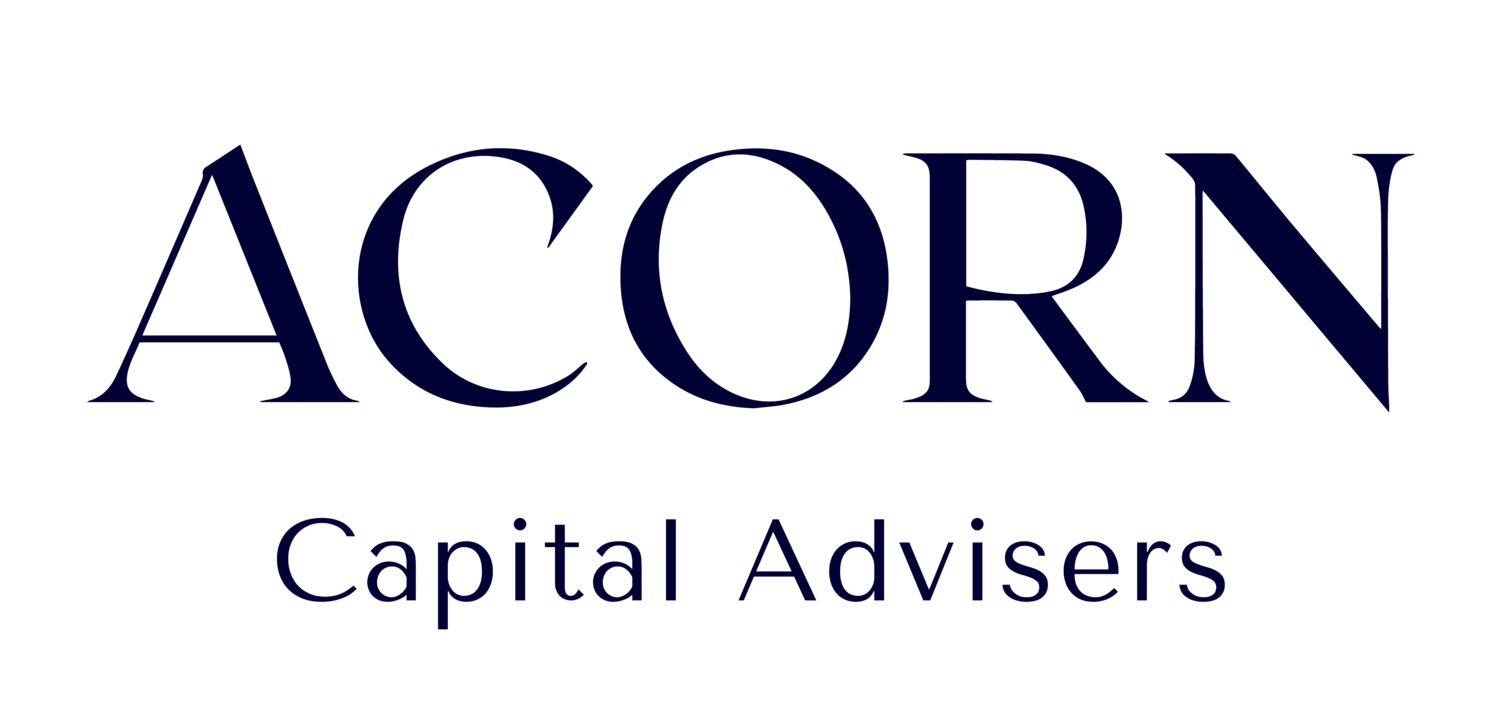Acorn Autumn Update
We hope you were able to have a relaxing break over the summer after such a busy first half of 2023.
I am delighted to announce that Helen Westgate, who joined us as head of client service in February 2021 has become a partner of Acorn.
I am also pleased to welcome Louise Adams who joined us as a partner last week. With her extensive experience as an international tax and trust barrister and CEO of two family offices, Louise adds new expertise to the team.
In this update we reflect upon the recent discussions we have been having with UHNW families and share with you the key insights on three issues:
The role of cash in portfolios today
Private assets - revisiting a portfolio following a change in family circumstances
SFOs - What the next generation are looking for?
Cash - Is it really King?
After a bruising period for mainstream asset classes, many investors have been looking for safe havens to shelter from market volatility. At the same time, the long-awaited return of high-interest cash accounts have hit the headlines.
The allure of cash in this context is understandable, indeed, we think cash has an important role in a portfolio – not only does cash provide liquidity and diversification but it also provides clients with optionality – the flexibility to respond and adjust to unpredictable future events (whether financial or personal) and a psychological safety net when markets are weak. We do, however, caution against viewing cash as a silver bullet.
The primary goal of investing is to protect against the erosive effects of inflation. We encourage clients to focus on the real interest rates available. Current interest rates in most countries are insufficient to offset the existing high levels of inflation. Piling into cash today in the hope of securing attractive returns is likely to result in disappointment.
It is also worth remembering that cash is not always ‘risk-free'. Banks are not indestructible and counterparty selection matters.
As "dry powder", cash has demonstrated its potential for shaping a portfolio's performance. By acting as a ballast during market downturns and providing opportunities during times of stress, cash allows investors to snap up distressed, underpriced assets. This ensures not just a margin of safety but also potential for superior risk-adjusted returns.
Investors who have held significant cash since 2010 missed the bull market, highlighting the difficulty of timing investment deployment. Even in falling markets, deciding when to buy, and then ultimately when to exit, remains a persistent challenge. What we advocate is introducing rebalancing or buy-sell guidelines as well as allocating capital to specialist managers with a track record in tactical asset allocation to mitigate the risk of being “a day late and a dollar short”.
The Challenges of a Slowing Private Equity Environment
The private equity landscape has changed dramatically. Exit activities have dropped a staggering 75% from their 2021 heights and have slid below pre-Covid levels. The result: a slowdown in distributions which has caught some investors off guard.
A case in point: we recently advised a multigenerational family with a well-established portfolio of private assets, spanning private equity, private debt, and venture capital, with investments diversified across various vintages and strategies. Their performance had been good but, mirroring broader capital market trends, their distributions had slowed whilst their capital calls continued. Were they at risk of having a liquidity mismatch?
We addressed two key concerns: What was the best strategy to fund their capital commitments? Secondly, given a recent change in family circumstances, did their current allocation to private markets still make sense?
Given the maturity of the portfolio, the client was used to funding commitments from distributions of prior vintages. However in the current environment, the fear was that they might resort to debt to make up for any shortfalls. Not an optimum solution given high interest rates.
Our approach was to model and stress test their cash flow across a range of market scenarios. The results were reassuring. Even in the most pessimistic distribution and call scenarios, the family had sufficient cash reserves to meet upcoming capital calls. This underscores the pivotal role of cash in a portfolio.
Furthermore, with family members having increasingly diverse liquidity needs, we evaluated the appropriate strategic level of private equity within the portfolio and what this meant for ongoing recommitment levels. This provided the family with reassurance that they would not have to undergo a costly portfolio repositioning exercise.
The key takeaway? Always be prepared. A strong cash reserve is a helpful start, but we encourage clients to have additional potential sources of liquidity (e.g. credit lines, liquid investments etc) to prepare for the unexpected.
Next generation family office insights
In July I had a super interesting coffee with Vahe Vartanian, founder and CEO of Global Family Office Community. We were comparing notes on the trends and challenges that SFOs are currently facing. Many are seeking a reset as they prepare for the 'Great Wealth Transition' — an expected $84 trillion wealth transfer by 2045.
Several are revisiting their original purpose and defining why they established their family office. Does it still work for them, and will it continue to do so for the next generation?
They are becoming more open to co-investments and sharing ideas around family office best practice with others. They understand the power of collaboration and the importance of quality networks. The stakes are high; having independent advisers they trust to share ideas with and to use as a sounding board provides them with a competitive advantage for accessing and executing on private investments. They need to choose their partners carefully.
They are also getting leaner, smarter with their operations. Given the war on talent and the ever-increasing costs, next generation family offices are becoming more strategic with the functions they do in-house and outsourcing more of their non-core activities. It is a new, flexible approach that frees up their time to focus on their operating businesses, philanthropy, and direct investments.
Next-generation family offices are enhancing governance and communication, moving away from top-down decisions. We see a greater focus on sustainability and impact investments in the investment strategy. Carve out thematic portfolios designed by the next generation sitting alongside the ‘core portfolio’.
As Vahe correctly pointed out, single family offices are not an industry, they are not a sector, they are separate entities looking after individual families. Each family may face common issues but are different to each other. They are not a homogenous source of private capital like traditional institutions. Each has its own purpose, definition, and strategy. They have long-term horizons and are not in a rush. If a product or a service does not align with their purpose and strategy, then why would they pursue it?
We have also recently refreshed our website – thank you those of you who kindly provided us with feedback to make it better.
Wishing you a fulfilling Autumn and we look forward to hearing your news.
Sally and the Acorn team




